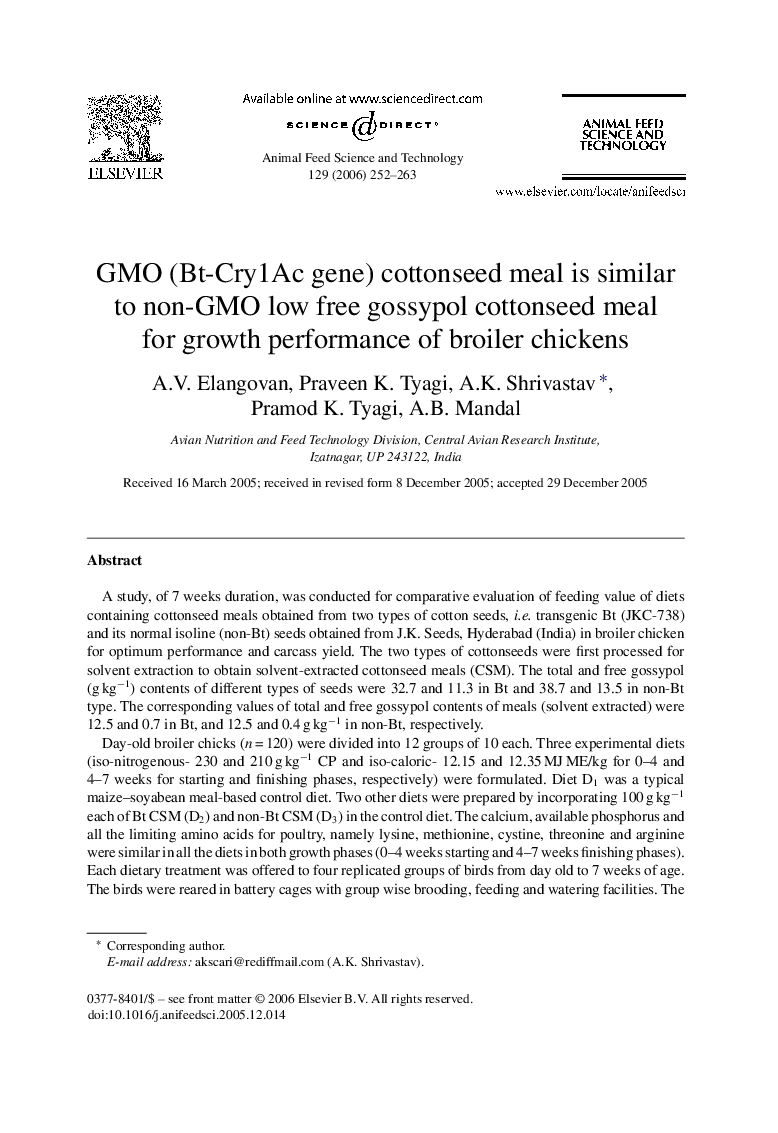| Article ID | Journal | Published Year | Pages | File Type |
|---|---|---|---|---|
| 2421173 | Animal Feed Science and Technology | 2006 | 12 Pages |
A study, of 7 weeks duration, was conducted for comparative evaluation of feeding value of diets containing cottonseed meals obtained from two types of cotton seeds, i.e. transgenic Bt (JKC-738) and its normal isoline (non-Bt) seeds obtained from J.K. Seeds, Hyderabad (India) in broiler chicken for optimum performance and carcass yield. The two types of cottonseeds were first processed for solvent extraction to obtain solvent-extracted cottonseed meals (CSM). The total and free gossypol (g kg−1) contents of different types of seeds were 32.7 and 11.3 in Bt and 38.7 and 13.5 in non-Bt type. The corresponding values of total and free gossypol contents of meals (solvent extracted) were 12.5 and 0.7 in Bt, and 12.5 and 0.4 g kg−1 in non-Bt, respectively.Day-old broiler chicks (n = 120) were divided into 12 groups of 10 each. Three experimental diets (iso-nitrogenous- 230 and 210 g kg−1 CP and iso-caloric- 12.15 and 12.35 MJ ME/kg for 0–4 and 4–7 weeks for starting and finishing phases, respectively) were formulated. Diet D1 was a typical maize–soyabean meal-based control diet. Two other diets were prepared by incorporating 100 g kg−1 each of Bt CSM (D2) and non-Bt CSM (D3) in the control diet. The calcium, available phosphorus and all the limiting amino acids for poultry, namely lysine, methionine, cystine, threonine and arginine were similar in all the diets in both growth phases (0–4 weeks starting and 4–7 weeks finishing phases). Each dietary treatment was offered to four replicated groups of birds from day old to 7 weeks of age. The birds were reared in battery cages with group wise brooding, feeding and watering facilities. The management and vaccination practices were kept identical for all the dietary treatments. Birds were weighed at weekly intervals and data of feed intake were also recorded simultaneously. At the end of seventh week of age, eight birds per treatment (two birds/replicate) were slaughtered to study the effect of feeding CSM types on different carcass traits and development of digestive and immune organs.Body weight gain, feed intake and feed conversion efficiency, did not differ statistically (P>0.05) either at starting (0–4 weeks), or overall (0–7 weeks) phases. However, during finishing phase (4–7 weeks), significantly (P<0.01) lower feed intake with better (P<0.05) FCR was observed in chicks fed Bt CSM diet. The carcass traits also remained statistically (P>0.05) similar due to various dietary treatments except for thigh (P<0.05). The dry matter metabolizability, nitrogen retention and blood biochemical constituents, viz. plasma protein, total cholesterol and haemoglobin did not differ statistically due to dietary treatments.The study concluded that neither the gossypol content nor transgenic gene/protein in Bt CSM had any deleterious effect on growth performance, blood biochemicals and various carcass characteristics of growing broiler chickens and therefore GMO (Bt-Cry1Ac gene) cottonseed meal is similar in growth performance to broilers as non-GMO low free gossypol cottonseed meal and could safely be included up to 100 g kg−1 level in maize–soybean meal-based diet up to 0–7 weeks of age of broiler chicken.
